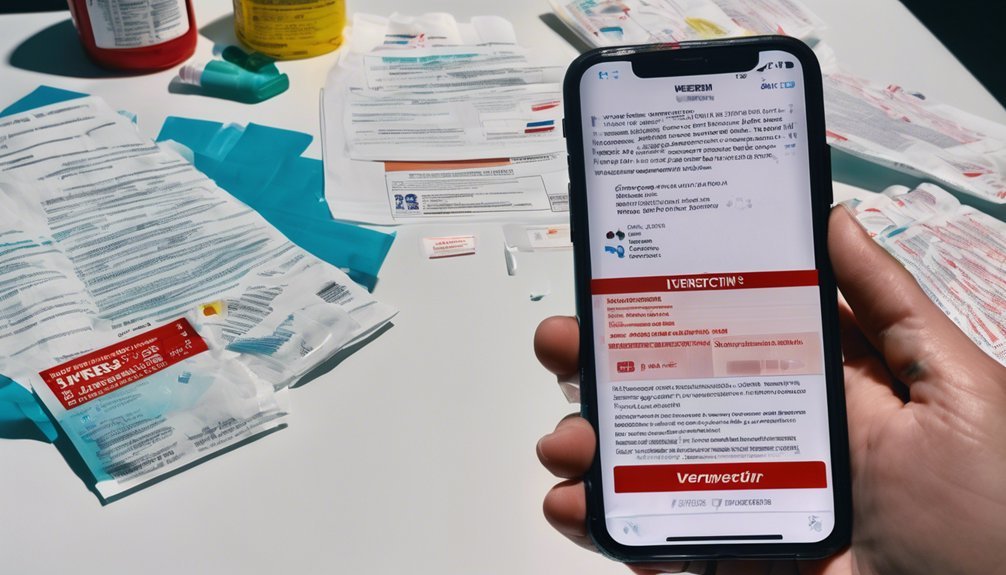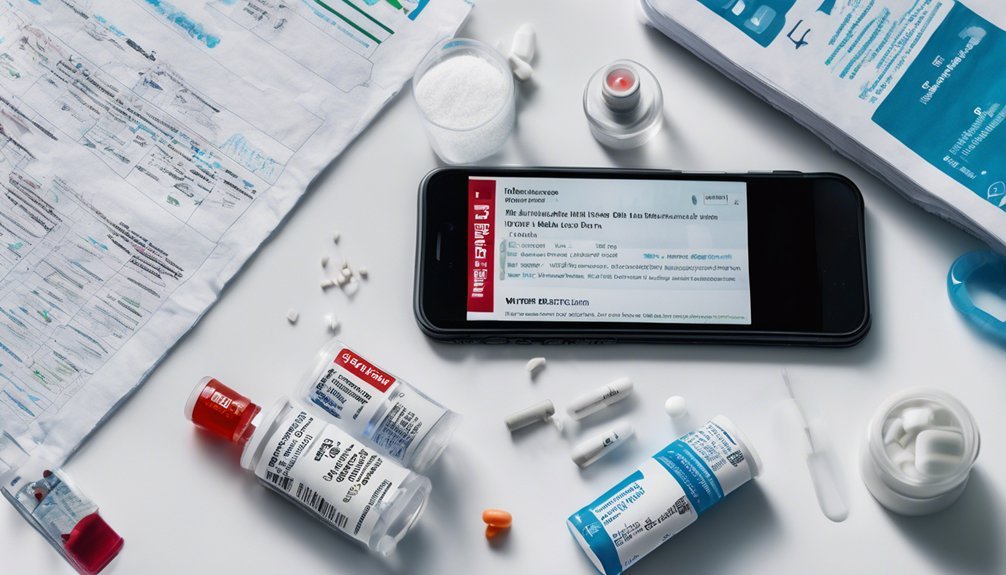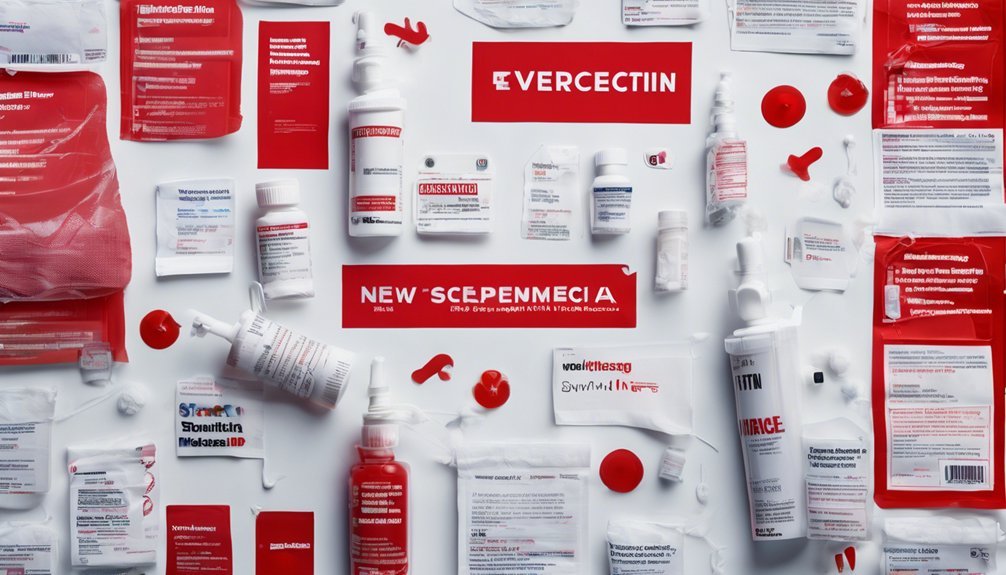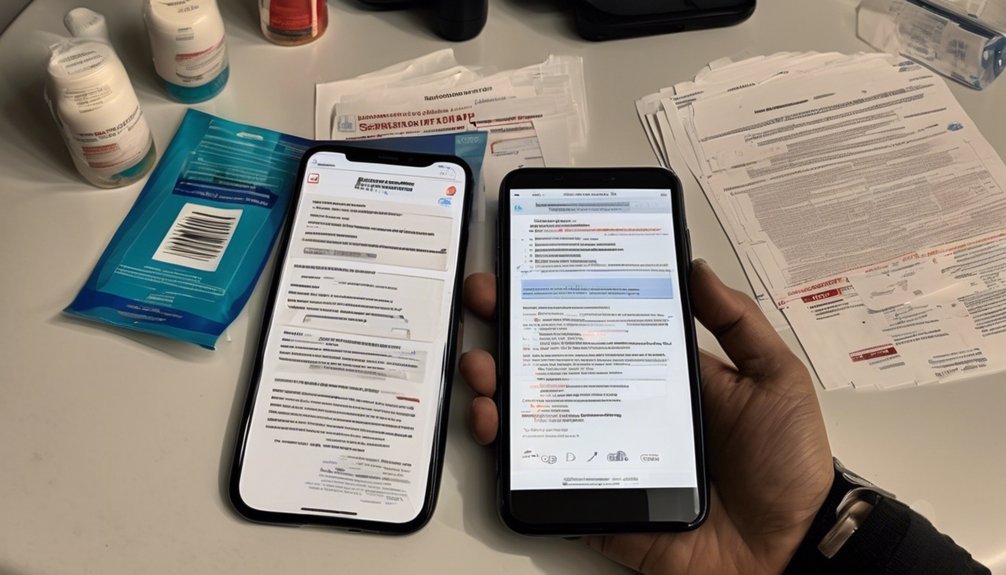Ivermectin is touted online as a cure-all, but the reality is far more complex. Regulatory agencies have issued clear warnings against its use for COVID-19, citing insufficient evidence and potential risks. Meanwhile, social media thrives on unverified claims that can mislead the public. Understanding the divide between official guidance and viral misinformation is crucial for making informed health decisions. What can you do to navigate this confusing landscape effectively?
Key Takeaways
- Regulatory agencies like the FDA and WHO advise against Ivermectin for COVID-19 due to insufficient evidence and potential health risks.
- Large clinical trials have shown no significant benefits of Ivermectin for treating COVID-19, contrary to some social media claims.
- Misinformation on social media can lead to misguided beliefs about Ivermectin, eroding trust in healthcare professionals and guidelines.
- Self-medicating with Ivermectin without professional guidance can result in serious health risks and toxic reactions.
- Evidence-based medicine emphasizes the importance of relying on rigorous research, rather than anecdotal claims often circulated on social media.
Overview of Ivermectin and Its Uses

Ivermectin is a medication primarily known for its effectiveness in treating parasitic infections. Its therapeutic applications extend beyond just humans; it’s also used in veterinary medicine. You might find it effective against conditions like onchocerciasis and lymphatic filariasis.
When considering its use, it’s crucial to follow established dosage guidelines to ensure safety and efficacy. For adults, the typical dosage can vary based on the specific infection being treated but usually falls within a range of 150 to 200 micrograms per kilogram of body weight.
Consulting healthcare professionals is essential before using Ivermectin, especially for off-label purposes. By adhering to appropriate guidelines, you can contribute to better health outcomes for those in need of this vital medication.
The Role of Regulatory Agencies
While many view Ivermectin as a promising treatment for various conditions, regulatory agencies play a crucial role in ensuring its safe and effective use. These agencies establish guidelines to protect public health through rigorous evaluation and monitoring.
| Regulatory Agency | Role in Ivermectin Oversight | Key Guidelines |
|---|---|---|
| FDA | Approves and monitors drugs | Use only as prescribed |
| EMA | Evaluates drug efficacy | Assess risks vs. benefits |
| WHO | Provides global recommendations | Advocates for safety |
Through regulatory oversight, agencies ensure that any claims about Ivermectin are backed by scientific evidence. By following agency guidelines, you can help ensure that treatments are both safe and effective for those you serve.
Scientific Evidence Supporting Official Warnings
As regulatory agencies have issued warnings about Ivermectin, it’s essential to examine the scientific evidence underpinning these advisories. The scientific consensus supports concerns about the use of Ivermectin outside its approved indications. This consensus is based on an evidence hierarchy that prioritizes high-quality studies.
Consider the following:
- Clinical Trials: Large-scale trials have shown no significant benefit of Ivermectin for COVID-19 treatment compared to placebo.
- Adverse Effects: Reports indicate serious side effects in patients using Ivermectin for unapproved purposes, raising safety concerns.
- Guidelines: Renowned health organizations, including the WHO and FDA, recommend against Ivermectin for COVID-19 due to insufficient evidence.
These points highlight the importance of relying on credible scientific evidence when evaluating treatment options.
Analysis of Social Media Claims

Despite the scientific consensus against the use of Ivermectin for COVID-19, social media platforms have become hotbeds for misinformation regarding its efficacy. You might encounter posts claiming Ivermectin is a miracle cure, often devoid of credible evidence.
This social media influence can distort public understanding, leading individuals to prioritize anecdotal experiences over scientific data. Many influencers and users promote Ivermectin without acknowledging its potential dangers or the lack of regulatory approval for COVID-19 treatment.
In a time when public health depends on accurate information, it’s crucial to critically evaluate these claims. Relying on trusted health sources and scientific research can help you navigate the sea of misinformation and make informed choices for yourself and your community.
Misinformation and Its Impact on Public Perception
Misinformation surrounding Ivermectin can significantly skew public perception, leading individuals to form misguided beliefs about its effectiveness in treating COVID-19. Misleading narratives spread through social media can erode public trust in healthcare professionals and established guidelines.
Misinformation about Ivermectin can distort public perception and undermine trust in healthcare professionals and guidelines.
Here are three key impacts of misinformation:
- Increased Anxiety: Conflicting information may heighten fear and uncertainty about treatment options.
- Distrust in Authorities: People may question the credibility of health organizations, undermining their role in public health.
- Poor Health Decisions: Misguided beliefs can lead individuals to seek unproven treatments, diverting them from effective care.
Understanding these consequences is crucial for fostering informed decision-making and rebuilding public trust in scientific guidance regarding Ivermectin and COVID-19 treatment.
The Risks of Self-Medicating With Ivermectin
Self-medicating with Ivermectin poses significant risks, particularly when individuals bypass professional medical advice.
You may underestimate the self-medication risks associated with using this drug without proper guidance. Misuse can lead to serious health consequences, including toxic reactions, drug interactions, and ineffective treatment outcomes.
Ivermectin is approved for specific conditions, and using it for unverified purposes can exacerbate existing health issues or create new ones. Additionally, without a healthcare provider’s oversight, monitoring for adverse effects becomes impossible.
If you’re considering Ivermectin, it’s crucial to consult a medical professional. They can provide the necessary guidance and ensure your safety, helping you avoid the pitfalls of self-medication that could jeopardize your well-being.
Comparative Efficacy: Ivermectin vs. Approved Treatments

While some may consider Ivermectin as an alternative treatment, it’s essential to compare its efficacy with approved therapeutic options for specific conditions.
Here are three key points to consider:
- Approved Treatments: FDA-approved medications have undergone rigorous testing, demonstrating their safety and efficacy for conditions like COVID-19 and parasitic infections.
- Ivermectin Efficacy: Current evidence shows that Ivermectin’s efficacy is limited compared to these established therapies, particularly for viral infections.
- Clinical Guidelines: Health organizations recommend relying on approved treatments, which have proven track records of success and safety, rather than unverified alternatives like Ivermectin.
Understanding these differences can help you make informed decisions that better serve the health needs of yourself and others.
Case Studies: Ivermectin Use in Real-World Scenarios
Despite the comparative efficacy of Ivermectin being questioned in clinical settings, it has still found its way into various real-world applications.
Some patients report using Ivermectin in self-treatment for conditions like COVID-19, seeking relief from symptoms based on anecdotal evidence. In these cases, patient experiences vary widely, with some claiming significant improvement while others report no change.
Healthcare professionals often face challenges in addressing these claims, balancing patient expectations with scientific guidance.
It’s essential to consider these real-world applications critically, as they may not align with approved treatment protocols. Engaging in open discussions about patient experiences can help bridge the gap between individual choices and evidence-based medicine, fostering a better understanding of treatment options.
The Importance of Evidence-Based Medicine
Evidence-based medicine (EBM) is crucial for ensuring that treatment decisions are grounded in the best available research and clinical expertise. By adhering to EBM principles, you can support patient care effectively.
Here’s why EBM matters:
- Evidence Hierarchy: EBM utilizes a structured evidence hierarchy, prioritizing high-quality studies that guide clinical decisions.
- Clinical Guidelines: It informs clinical guidelines, ensuring that medical recommendations are based on rigorous research rather than anecdotal evidence or social media claims.
- Improved Outcomes: By relying on EBM, you contribute to better patient outcomes, as treatments are based on proven efficacy and safety.
Incorporating EBM into practice helps you serve others with confidence, fostering trust in healthcare decisions and promoting better public health.
Public Health Implications of Misinformation

Misinformation poses significant threats to public health by undermining the trust in medical guidance and promoting harmful practices. When you encounter public health misinformation, especially on social media, it can lead to confusion and poor decision-making among individuals seeking help.
This misinformation often spreads rapidly, influencing perceptions about treatments like ivermectin, which can divert people from effective therapies. The pervasive social media influence can create echo chambers, reinforcing inaccurate beliefs and complicating public health efforts.
As misinformation circulates, it risks overwhelming healthcare systems and endangering lives. It’s crucial to recognize these dangers and advocate for accurate information, ensuring that your actions contribute positively to community health rather than propagate falsehoods.
Strategies for Informed Decision-Making
How can you ensure your healthcare choices are grounded in reliable information? Making informed choices requires a commitment to critical thinking and evaluating sources.
Here are three strategies to help you navigate health-related claims:
- Consult Trusted Sources: Rely on information from reputable medical organizations and peer-reviewed studies rather than social media posts.
- Engage Healthcare Professionals: Discuss your concerns and questions with qualified healthcare providers who can offer evidence-based guidance tailored to your needs.
- Evaluate Evidence: Look for clear data and research that support health claims. Be cautious of anecdotal evidence or testimonials lacking scientific backing.
Frequently Asked Questions
Can Ivermectin Be Used for COVID-19 Treatment?
Ivermectin’s efficacy for treating COVID-19 isn’t supported by robust evidence, and relying on misinformation can be harmful. It’s crucial to seek reliable sources and follow medical guidance for effective COVID-19 treatment options.
What Are the Side Effects of Ivermectin?
Ivermectin can cause side effects like nausea, diarrhea, dizziness, and skin rash. In rare cases, it may lead to ivermectin toxicity, resulting in more severe adverse reactions. Always consult a healthcare professional for guidance.
Is Ivermectin Safe for Pets?
Is your pet’s safety a priority? Ivermectin can be safe for pets when used correctly, but always seek veterinary guidance. Misuse can lead to serious side effects, so consult your veterinarian before administering it.
How Is Ivermectin Typically Administered?
Ivermectin’s typically administered through oral dosage or topical application. For oral use, you’ll give it as a pill or liquid, while for topical use, you’ll apply the cream or lotion directly onto the skin.
Are There Any Legal Issues With Ivermectin Prescriptions?
When it comes to ivermectin prescriptions, you’ll find tangled webs of prescription regulations and potential legal liabilities. Staying informed and compliant is crucial to avoid the pitfalls that could arise from misuse or misprescribing.
Conclusion
In a world awash with conflicting narratives, it’s crucial to anchor your health decisions in verified information. Regulatory agencies and scientific evidence serve as lighthouses, guiding you through the fog of social media claims. Misinformation can sow seeds of confusion, leading to misguided choices that jeopardize your well-being. By prioritizing evidence-based medicine and seeking expert guidance, you can navigate this turbulent sea, ensuring your health isn’t adrift in a tide of unfounded assertions.




